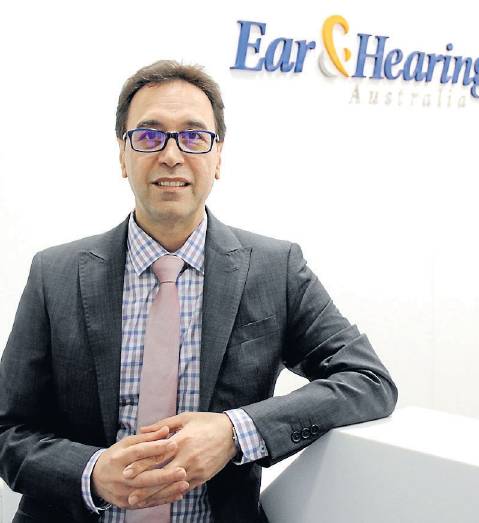Discreet devices can end those long silences
Getting a hearing aid to suit your lifestyle requires an expert.
One in six Australians suffers from hearing loss, increasing to three in four people aged 70 and older.
For the millions who suffer it, hearing loss can have a range of flow-on effects. Social and psychological consequences of hearing loss can adversely affect relationships, careers and overall quality of life.
“When you have hearing loss, it can become very difficult to participate in meetings, noisy and social situations,” says Dr Moh Dadafarin, director and principal audiologist at Ear & Hearing Australia.
“You have to concentrate to fill the gaps and so you can gradually lose interest; you may also, therefore, avoid those social situations. You might stop participating in your favourite activities, might lose interest in watching TV because you have to turn the subtitles on. Without knowing it, your life begins to be affected in major ways.”
Hearing loss can affect relationships with family. “It’s frustrating for your family and friends to repeat themselves all the time. Grandchildren might start avoiding you because they don’t enjoy repeating themselves,” he says.
Hearing loss can also lead to physical issues including a faster rate of memory and cognitive decline, and auditory deprivation – a condition where the brain loses the ability to interpret words.
Dr Dadafarin has seen first hand how hearing aids have improved the quality of his patient’s lives and their relationships. “People who use hearing aids generally see noticeable improvements in their quality of life,” he says.
A hearing aid can help improve a wearer’s relationships with family, grant them greater independence, enable them to stay in the workforce longer and generally enhance their self-confidence. “You’re more confident when your hearing is good,” Dr Dadafarin says. Aids no longer look like those the bulky instruments worn by our grandparents. Technological breakthroughs mean that is an outdated image. “Hearing aids have come of age,” he says. “These days they’re discreet, most are rechargeable and don’t need batteries. There are some which can be inserted in your ears and they stay in for months at a time without the need for daily insertion and removal.”
Established in 1998, Ear & Hearing Australia is one of the largest independent hearing practices in Australia, with clinics across Melbourne.
Its team of qualified audiologists have years of experience in diagnostic assessment as well as selecting and fitting technologically advanced hearing aids. All have, at a minimum, masters or doctorate qualifications in audiology.
“We are a patient-centred practice,” Dr Dadafarin explains. “Our focus is on outcomes. Our audiologists receive no commissions, bonuses or other financial incentives. Our clients have access to all options and we provide unbiased advice.”
First-time visitors to the clinic undertake a diagnostic audiological assessment with an audiologist. The evaluation helps determine how hearing loss is affecting the client’s life, reflecting the practice’s holistic approach to what they do.
Ear & Hearing Australia’s audiologists consider a client’s career, hobbies, cosmetic preferences, budget and device management abilities to help come up with the best solution for their hearing needs.
‘People who use hearing aids generally see noticeable improvements in their quality of life.’
- Moh Dadafarin (left)
